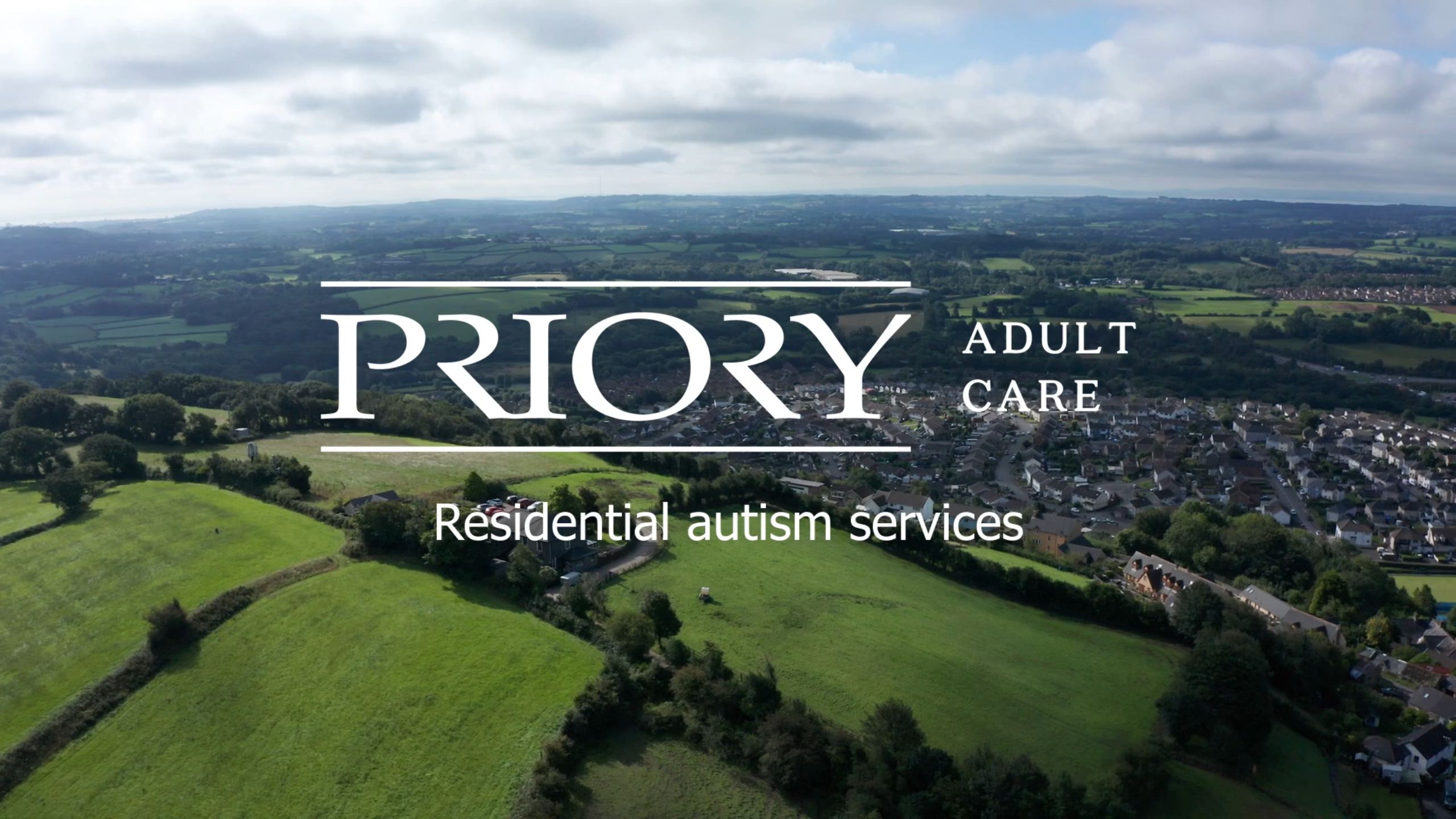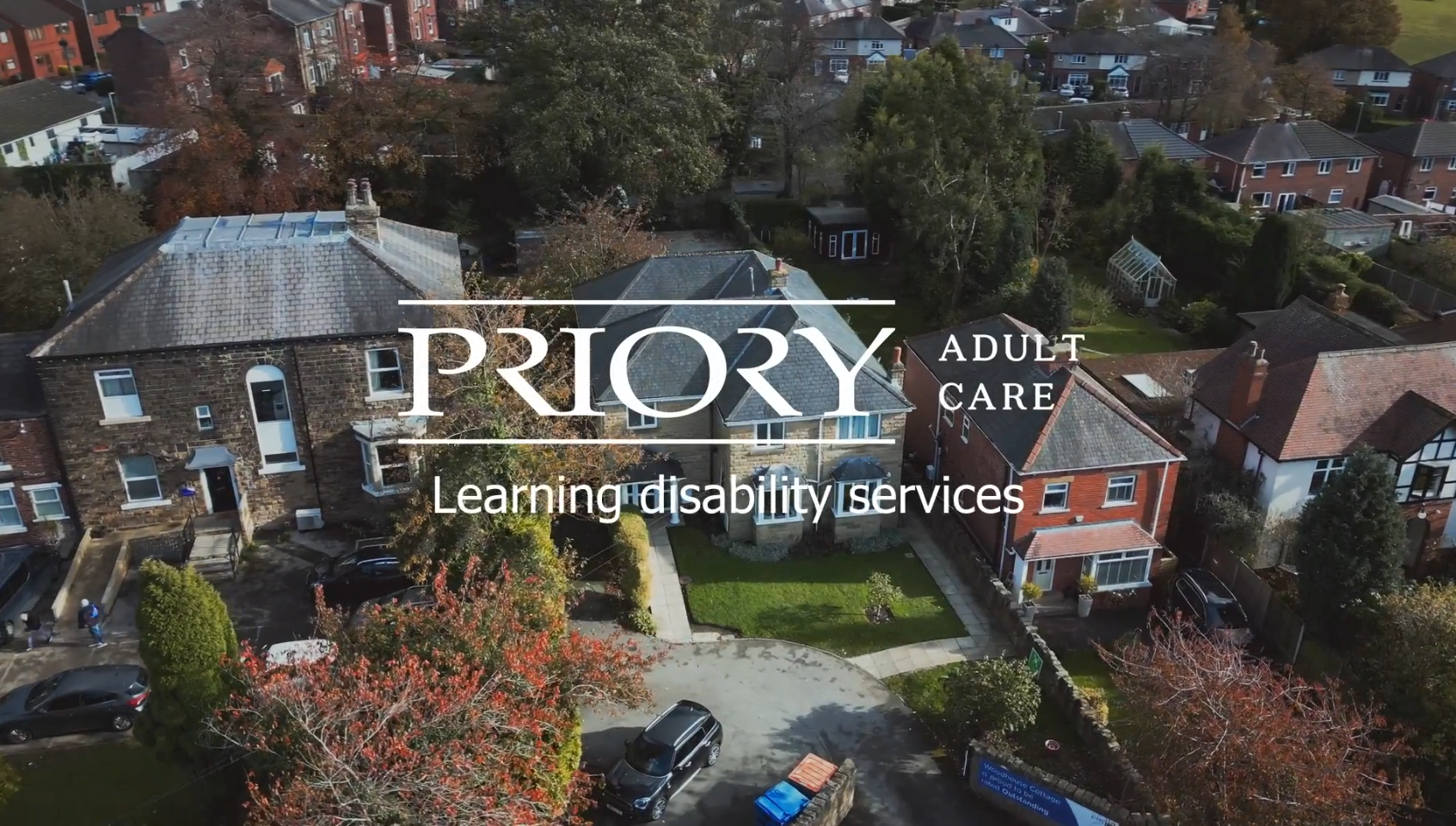About this location
Tithe Barn is located in Sellack, Ross-on-Wye. The service provides residential support for adults who are autistic or have a learning disability, and may also present with behaviours that challenge.
We offer our residents the chance to live in a homely environment whilst receiving specialist support from caring, competent and well-trained staff. Our home is in a rural setting in the Herefordshire countryside and is surrounded by eight acres of private land, providing access to walks.
Services at a glance
There are a total of ten bedrooms at the site. Of these:
Click here to enable this content
About our service
Facilities and environment
Tithe Barn is set within seven acres of grounds. We have a range of communal areas for residents to enjoy, which includes a lounge/dining area, an activities room and a meeting room.
We also have a large shared garden, complete with:
- Secure fencing
- Woodland trail
- Sensory garden
We also have specialised equipment within the home, such as sensory lighting and our own heated swimming pool. In addition, we have several site vehicles to help us to meet the needs of the people we support.
Our bedrooms
All of our bedrooms are comfortable, welcoming and can be personalised to individual tastes.
Our approach to support
Everyone who lives at Tithe Barn has their own person-centred care plan, which is co-produced with input from the individual, their family members and professionals involved in their care. We aim to help everyone in our care to make their own choices about the support they receive. This may include support in a number of areas, such as going out in the community, personal care, cooking and cleaning, managing finances and maintaining family relationships.
We offer innovative, person-centred support programmes in a safe and caring environment. Our support approaches at Tithe Barn include:
- Positive behaviour support (PBS)
- Non-invasive PROACT-SCIPr UK restraint techniques
- Speech and language therapy (SaLT)
We also have support from a local multidisciplinary team (MDT), which includes an intensive support team, as well as psychology and psychiatry input. The lengths of the placements that we offer at Tithe Barn can be medium or long-term residential, depending on the needs of each person.
Activities
Everyone who lives at Tithe Barn has their own personalised activities planner and are encouraged to take part in activities which are meaningful and fulfilling to them. Our dedicated team organise a variety of activities at the home, as well as out in the community.
We focus on supporting our residents to grow their independence. For some people, this may mean developing their daily living skills within the home. For others, this could be accessing work or educational opportunities in the local community.
Our activities include:
- In-house activities and recreational pursuits
- Access to education and paid employment opportunities
- Planned community-based activities, both on an individual basis and in a group
Pathways
Through our network of healthcare, residential and supported living facilities, we provide unique care pathways which help the people we support to progress towards greater independence. Every individual we support is provided with a bespoke pathway plan, tailored according to their individual needs. We aim to ensure that each person is supported to live a fulfilling and active life in the community. At Tithe Barn we have close links with Priory Supported Living The Shires.
Our team
Our highly experienced team consists of:
- Service manager
- Deputy manager
- Support worker
- PBS practitioner
- Activities co-ordinator
Our staff are available day and night, and include sleeping-in staff, so our residents are supported at all times. Our team receives specialist staff training, designed to meet the needs of each individual we support. This includes:
- Lifeguard training
- PROACT-SCIPr-UK® training
A message from our site leader

I have worked for the company for several years and I get great pleasure in helping the service user achieve their life goals and independence
Tithe Barn’s site leader
Comments from our residents and their family and friends
This is my first residential placement and I have been made to feel comfortable and welcome at Tithe Barn. I feel confident within my own skin and have already developed my independence. I feel I now have more of a voice to express my wants and wishes. I am working towards life skills and independence, and am eventually hoping to move onto supported living
Family and friends FAQs
How does home leave work?
We support our residents to attend family events and visit home. We will work with the resident and their relatives to ensure possible risks are managed and that everyone is supported, based on family needs and preferences.
Can friends and families visit?
Yes, we welcome friends and family to visit. We have an open door policy.
Will I be involved and kept up to date with the progress of my loved one’s care and support?
At Tithe Barn, we strive to keep the loved ones of our residents involved in their care. We provide updates as and when needed, for example, after medical appointments or to share positive stories. This is often arranged by the person’s key worker or senior on duty. Loved ones are also able to use email or phone the site for updates when required. We are open, clear, and transparent with all family members and professionals.
Will my loved one be able to have a phone or call me?
Yes, all residents have access to our phone lines to ensure contact with loved ones and friends. Most residents have their own device to contact loved ones. This can be done with or without support, depending on the needs of the people we support.
What are the bedrooms like?
The bedrooms are of a standard size, depending on whether the resident has their own self-contained flat. Bedrooms are painted in a magnolia and gloss finish, with furnishings if required. After a 3-month period, the resident can choose colours if they wish to, which will make their room more person-centred. Furnishing can be added or removed, depending on the needs and wants of the resident.
Are external doors kept locked?
This varies depending on the needs of the people we support. We follow least restrictive practice so if we can avoid locking doors without imposing risk, we will. We do lock the external doors at night as a security measure. Any doors that need to be accessed during these times can be, with the support of a staff member. There are doors that are locked for safety reasons as there is no need for residents to access certain areas.
What do residents eat and how do meal times work?
Residents are supported to choose and, where possible, prepare what they want to eat. Mealtimes are fully supported and staffed to prevent unnecessary risk to anyone we support. We have a 4-week rolling menu, which offers choice and controlled options, to promote healthy diets and wellbeing. We also provide healthy snacks.
For residents who cannot access the kitchen area due to known risk, then meal preparation is fully staff-led. For others, we support their preferences in a safe, proactive manner. We will also support residents with any problems or concerns around mealtimes, such as purchasing or preparing food. Our team will also seek guidance from family members and professionals to ensure that special dietary requirements are catered for and that person-specific risk management plans are in place. We recognise that one size won’t fit all, so we tailor our approach to suit individual residents. This includes involving outside catering agencies and a speech and language therapist (SaLT), to support with choking risks and dysphagia diagnoses.
How does laundry work?
We have a dedicated laundry room on-site, which comprises two washing machines and two tumble driers. One of each are industrial-sized and the others are standard models to encourage residents to complete their own washing as part of their daily living skills. This will help if they choose to move on to supported living in the future. All control of substances hazardous to health (COSHH) materials are provided within the laundry area, and we make sure that these are in line with Priory policies to ensure infection control.
Who does the housekeeping and domiciliary tasks?
Residents are encouraged to participate towards their daily living skills if they are able to do so, even if it is minimal. Any household duties that the resident is unable to complete are done by staff, to ensure cleanliness and hygiene standards remain high. Each resident’s needs and requirements are different, so we set individual targets and goals to work towards independence.
Is there anything they can’t bring or have?
We store and manage all food and drink on-site. This is in line with the needs of residents who have a diagnosis of Prader-Willi syndrome. As we are a specialist service, all residents need some level of support with storing and purchasing food. Therefore, access to all eating and drinking areas is managed by staff, and food storage areas are kept locked to reduce the risk of theft, overeating and overall risk to people in our care. This is covered within Deprivation of Liberty Safeguards (DoLS).
We work closely with advice and guidance from the Prader-Willi Syndrome Association (PWSA) and staff also receive training on how and why we support people in the ways we do. Some areas are restrictive but this is proportionate to risk for those in our care.
We would ask that residents do not bring valuables such as family heirlooms to our home, as we cannot guarantee their safety. We may place restrictions on some items where the risks cannot be appropriately managed, such as non-approved drugs and medications, solvent-based products, lighters, and ornaments that could be a self-harm risk or a risk to people with behaviours that challenge. All items brought in are managed and risk assessed, and we support with the opening of all parcels and deliveries to prevent risk. For example, if a resident had the opportunity to order items online that would put themselves and others at risk. At times, it may be necessary to remove or prevent access to certain items, however, this is based on history of needs and risk.
In addition, we advise people to keep items of importance or value in their rooms, so that these are not damaged in communal areas. Residents have a key to their bedrooms so they can keep personal items secure and safe; staff support and promote this. Staff carry a master key, and where necessary, will access bedrooms based on a person’s needs and safety assessments.
How do activities work?
When compiling activities for our residents, we have discussions with our activities co-ordinator to organise the most suitable activities for the individual, according to their needs and preferences. We involve our residents in this process, using the communication method they prefer, to ensure they fully understand and can make informed decisions. Each resident can choose whether to participate in these activities, depending on how they are feeling each day.
How will residents be supported with their behavioural needs?
Residents who have a history of behaviours that challenge may receive PBS. This is based on the individual and will be taken into consideration at the point of referral, allowing us to set up the care package to meet the needs of the resident and reduce risk. We have close links to the local intensive support team, as well as psychology and psychiatry support in Herefordshire, to ensure a joined-up approach.
We use the PROACT-SCIPr-UK® framework, which means we focus on proactive strategies, rather than physical intervention. We require our care plans which include restrictions to be assessed frequently, for example, procedures for interventions such as pro re nata (PRN) medication are regularly reviewed and removed, where possible.
Do residents and families have an input into the care plans?
When compiling care plans and making best interest decisions, we encourage and seek input from all professionals and family members, as well as the resident themselves if they are deemed to have capacity. This is so we can gain the best picture of the resident’s needs and requirements, and ensure person-centred care is provided in the least restrictive way during their stay with us. We also hold monthly ‘Our Voice’ meetings with the people we support, in order to gain personalised opinions and feedback on the service they receive, and use this information to enhance the service we provide, where possible.
What are the car parking facilities?
Tithe Barn is located on the same site as Stable Cottage. There are two separate car parks for staff, professionals, visitors and residents. The car park outside Tithe Barn is larger so we ask staff to park their vehicles there, to allow easier access for entry to Stable Cottage, if necessary. We do ask visitors who are visiting Stable Cottage to use the Stable Cottage car park during their visit.
What is the smoking policy?
We have a designated smoking area situated outside, near the car park, for residents who choose to smoke or vape.
What are your fees and how are they funded?
Our fees can vary and are based on an assessment of each individual's needs. Many people are eligible for financial help towards the cost of support, and this funding can be accessed by contacting your local authority. Once funding has been agreed, we will work with your local care team to put together a bespoke package of care. Please note, referrals for NHS or Local Authority funded services must come from a referring organisation.
How to make a referral
Our service provides high quality support to people with varying levels of need. Referrals can be made through the individual’s social care team or, if relevant, their local health authority. If you are a professional looking to make a referral, please call us or fill in our enquiry form.











